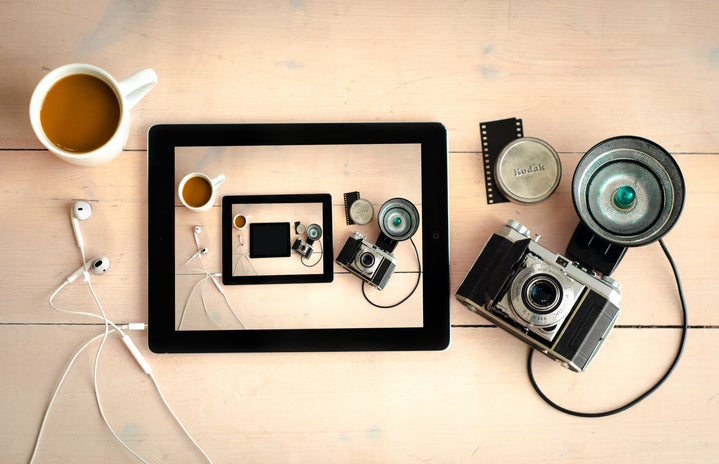This article is part of a series on Her Campus Kenyon called “What Empowers Me.” Keep checking our site to read more articles about what makes our staff writers feel empowered!
This summer I did something I’d been waiting to do since I turned eighteen—get my first tattoo. I waited so long (about three years) not because I was unsure if I wanted something permanently imprinted on my body, but because I was waiting for just the right inspiration. Like many other firsts, getting that first tattoo somehow feels tinged with more significance. The first, while it may not remain the favorite, holds a special place as the catalyst that broke through the bubble of not knowing, of inexperience.
I know so many people who would probably never get a tattoo, but still have thought about what they would want if they did. The fun part is brainstorming; the tricky part is actually choosing something. Ultimately, I decided on a relatively small outline of a daisy that has been slightly damaged on my inner right bicep.
About two hours after I got my tattoo!
When people ask if it hurt, I say yes. I want to tell them that it was the most euphoric pain I’ve ever felt and that I was dopily smiling and laughing to myself while it was happening. Usually I don’t say this, though, because I’m worried I’ll sound like a masochistic maniac. But having a tattoo gun jammed into my arm was honestly the most productive pain I have ever felt. It felt good because I knew something beautiful was going to come out of it.
When people ask about what it means, I tell them it’s inspired by a scene from the movie Harold and Maude. If I’m feeling talkative, I’ll describe how the two main characters Harold and Maude are sitting in a field of daisies. Maude asks Harold which sort of flower he could be if he could choose anything. Harold half-heartedly gestures to one of the daisies in the field and says, “One of those, I guess. They’re all the same.” But Maude is dismayed by this answer and counters that “There are all kind of observable differences!” She goes on to say, “that much of the world’s sorrow comes from people who are this [pointing to a daisy], yet allow themselves be treated as that [gestures to the whole field of daisies].”
Most of the time people are satisfied with that answer, and I don’t feel compelled to interpret further what it means to me. A huge part of the reason my tattoo feels empowering is because it’s something I did entirely for me. I am under no obligation to explain it to anyone unless I choose to. When I do chose to share the full meaning, it is a way for me to connect with someone past superficialities because it is so intensely personal.
For a lot of people, tattoos are just art. For many more, I think, tattoos have deeper meaning. They are not only a form of self-expression, but can also be reminders of people, events, achievements, or really anything that is important to them. As my favorite tatted musician, Frank Turner, says, “I tend to think of them as stickers on a suitcase.” For many people, the fear that they won’t like their tattoo ten years from now is a significant deterrent. But tattoos are markers of where a person has been in life. Although they in and of themselves are static, their meaning to the person they belong to may change.
Frank Turner showing off just a few of his tattoos
As of this year, around three in ten (29%) Americans, and close to half (47%) of Millennials, say that they have at least one tattoo. Although tattoos are much more widely accepted now than, say, fifteen years ago, people with tattoos still face some discrimination, especially in the workplace. People with visible tattoos are often thought to be less intelligent and attractive, and more rebellious. As a newly tatted individual, to put it mildly, this hurts my feelings. Though I understand the desire to have neat, clean, and professional looking employees, denying someone competent a job simply because they have tattoos smothers a person’s individuality and outright disrespect a person’s freedom to be who they are.
The same summer I finally decided to commit to my tattoo, the restaurant where I worked revised its employee handbook. It now states that tattoos are not permitted for employees. If a current employee already has a tattoo, they’re supposed to cover it up. Roughly half of the employees who already worked there with me, some for multiple years, had visible tattoos. Our mangers were relatively lenient about the tattoo policy so those with tattoos would occasionally, but not always, be asked to cover up. More worrisome to me at the time was that the handbook goes so far to say any current employees who acquire a tattoo during their employment will be fired. Technically, this means that I should have been fired halfway through the summer. But thanks to forgiving managers, whom I honestly don’t think cared as much about the presence of tattoos as the handbook did, I didn’t lose my job. I went about my job as usual, and nobody, especially not the customers, seemed to care or even notice a difference.
Despite this disheartening experience, having a tattoo has been empowering. I like knowing that even when I’m wearing simple clothing, there’s still a piece of my self-expression peeping through. And while I can’t choose the shape of my body, I can choose how I present it to the world, and, more importantly, to myself. That kind of control is invigorating. I already know I want at least two more tattoos in the next couple years. For now, though, I look forward to living with the one I have and experiencing how its meaning will grow change along with me.
Image Credit: Emily Stegner, Modern Body Art, The Harris Poll

